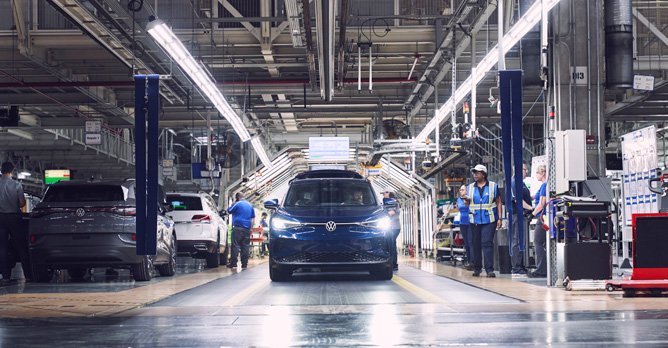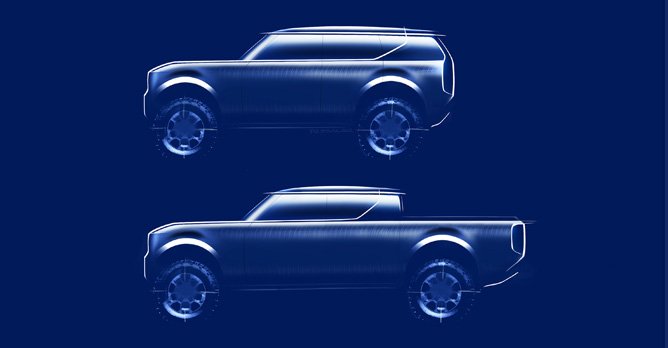Volkswagen renews commitment to North America
14 Mar 2023|2,522 views
The Volkswagen Group has announced a series of fresh plans as part of a commitment to raise its presence in North America.
First highlight for the group is the fact that a new battery gigafactory is set to be established in Ontario, Canada, in collaboration with its battery manufacturer PowerCo SE. The new plant will join Volkswagen's current cell factory facilities in Salzgitter, Germany, and Valencia, Spain, as its third battery assembly site, and will supply the Group brand's battery-electric vehicles in the region with cutting-edge battery cells.
The site is said to have been chosen as it offers a local supply of raw materials as well as wide access to clean electricity.
On the product front, the Volkswagen Group will introduce a total of 25 new battery-electric models in the U.S.A through 2030. The lineup of battery electric vehicles from the group currently available in the U.S.A include the Volkswagen ID.4, as well as the Audi Q4 e-tron.
To facilitate this product growth, the group will be upgrading its North American plants in Puebla and Silao, Mexico for the assembly of battery-electric vehicles, and is considering the use of the sites to assemble components for these vehicles in the second-half of the decade. Volkswagen will additionally ramp up production of the ID.4 electric SUV at its Chattanooga site in the U.S.A.

 Volkswagen's Chattanooga site (pictured), will see a ramp up of production, while the Group's plants in Puebla and Silao, Mexico will also be upgraded Volkswagen also plans to enter the truck and rugged SUV segments in the U.S.A with a new Scout brand.
Volkswagen's Chattanooga site (pictured), will see a ramp up of production, while the Group's plants in Puebla and Silao, Mexico will also be upgraded Volkswagen also plans to enter the truck and rugged SUV segments in the U.S.A with a new Scout brand.
First announced in May 2022 with a teaser sketch of an SUV and a pickup truck, the new sub brand will build vehicles designed and developed from the ground up on a new all-electric platform that emphasises off-road capability.
To this end, a new assembly facility in South Carolina, U.S.A is expected to start production by the end of 2024, with annual capacity set to reach 200,000 vehicles.
Of course, this growth in electric vehicles will also need to be supported with a charging infrastructure. To accomplish this, the Volkswagen Group will expand its collaboration with charging infrastructure firm Electrify America to establish a coast-to-coast charging network in the U.S.A and Canada.
This network will comprise of 800 stations and offer a total of 3,500 direct current fast chargers, all powered by 100% renewable energy. Volkswagen states that an additional 'Boost Plan' is also on the cards, which will more than double this goal by 2026.
And on the software front, Volkswagen's software and technology company CARIAD has also established a new technology hub, comprising of a team of 200 software engineers based in both the greater Seattle area and Silicon Valley. This team is currently working on an Automotive Cloud that will connect the next generations of vehicles from all Group brands like Volkswagen, Audi, and Porsche with next generation software in the automated driving and digital experience space.
First highlight for the group is the fact that a new battery gigafactory is set to be established in Ontario, Canada, in collaboration with its battery manufacturer PowerCo SE. The new plant will join Volkswagen's current cell factory facilities in Salzgitter, Germany, and Valencia, Spain, as its third battery assembly site, and will supply the Group brand's battery-electric vehicles in the region with cutting-edge battery cells.
The site is said to have been chosen as it offers a local supply of raw materials as well as wide access to clean electricity.
On the product front, the Volkswagen Group will introduce a total of 25 new battery-electric models in the U.S.A through 2030. The lineup of battery electric vehicles from the group currently available in the U.S.A include the Volkswagen ID.4, as well as the Audi Q4 e-tron.
To facilitate this product growth, the group will be upgrading its North American plants in Puebla and Silao, Mexico for the assembly of battery-electric vehicles, and is considering the use of the sites to assemble components for these vehicles in the second-half of the decade. Volkswagen will additionally ramp up production of the ID.4 electric SUV at its Chattanooga site in the U.S.A.

First announced in May 2022 with a teaser sketch of an SUV and a pickup truck, the new sub brand will build vehicles designed and developed from the ground up on a new all-electric platform that emphasises off-road capability.
To this end, a new assembly facility in South Carolina, U.S.A is expected to start production by the end of 2024, with annual capacity set to reach 200,000 vehicles.
Of course, this growth in electric vehicles will also need to be supported with a charging infrastructure. To accomplish this, the Volkswagen Group will expand its collaboration with charging infrastructure firm Electrify America to establish a coast-to-coast charging network in the U.S.A and Canada.
This network will comprise of 800 stations and offer a total of 3,500 direct current fast chargers, all powered by 100% renewable energy. Volkswagen states that an additional 'Boost Plan' is also on the cards, which will more than double this goal by 2026.
And on the software front, Volkswagen's software and technology company CARIAD has also established a new technology hub, comprising of a team of 200 software engineers based in both the greater Seattle area and Silicon Valley. This team is currently working on an Automotive Cloud that will connect the next generations of vehicles from all Group brands like Volkswagen, Audi, and Porsche with next generation software in the automated driving and digital experience space.
The Volkswagen Group has announced a series of fresh plans as part of a commitment to raise its presence in North America.
First highlight for the group is the fact that a new battery gigafactory is set to be established in Ontario, Canada, in collaboration with its battery manufacturer PowerCo SE. The new plant will join Volkswagen's current cell factory facilities in Salzgitter, Germany, and Valencia, Spain, as its third battery assembly site, and will supply the Group brand's battery-electric vehicles in the region with cutting-edge battery cells.
The site is said to have been chosen as it offers a local supply of raw materials as well as wide access to clean electricity.
On the product front, the Volkswagen Group will introduce a total of 25 new battery-electric models in the U.S.A through 2030. The lineup of battery electric vehicles from the group currently available in the U.S.A include the Volkswagen ID.4, as well as the Audi Q4 e-tron.
To facilitate this product growth, the group will be upgrading its North American plants in Puebla and Silao, Mexico for the assembly of battery-electric vehicles, and is considering the use of the sites to assemble components for these vehicles in the second-half of the decade. Volkswagen will additionally ramp up production of the ID.4 electric SUV at its Chattanooga site in the U.S.A.

 Volkswagen's Chattanooga site (pictured), will see a ramp up of production, while the Group's plants in Puebla and Silao, Mexico will also be upgraded Volkswagen also plans to enter the truck and rugged SUV segments in the U.S.A with a new Scout brand.
Volkswagen's Chattanooga site (pictured), will see a ramp up of production, while the Group's plants in Puebla and Silao, Mexico will also be upgraded Volkswagen also plans to enter the truck and rugged SUV segments in the U.S.A with a new Scout brand.
First announced in May 2022 with a teaser sketch of an SUV and a pickup truck, the new sub brand will build vehicles designed and developed from the ground up on a new all-electric platform that emphasises off-road capability.
To this end, a new assembly facility in South Carolina, U.S.A is expected to start production by the end of 2024, with annual capacity set to reach 200,000 vehicles.
Of course, this growth in electric vehicles will also need to be supported with a charging infrastructure. To accomplish this, the Volkswagen Group will expand its collaboration with charging infrastructure firm Electrify America to establish a coast-to-coast charging network in the U.S.A and Canada.
This network will comprise of 800 stations and offer a total of 3,500 direct current fast chargers, all powered by 100% renewable energy. Volkswagen states that an additional 'Boost Plan' is also on the cards, which will more than double this goal by 2026.
And on the software front, Volkswagen's software and technology company CARIAD has also established a new technology hub, comprising of a team of 200 software engineers based in both the greater Seattle area and Silicon Valley. This team is currently working on an Automotive Cloud that will connect the next generations of vehicles from all Group brands like Volkswagen, Audi, and Porsche with next generation software in the automated driving and digital experience space.
First highlight for the group is the fact that a new battery gigafactory is set to be established in Ontario, Canada, in collaboration with its battery manufacturer PowerCo SE. The new plant will join Volkswagen's current cell factory facilities in Salzgitter, Germany, and Valencia, Spain, as its third battery assembly site, and will supply the Group brand's battery-electric vehicles in the region with cutting-edge battery cells.
The site is said to have been chosen as it offers a local supply of raw materials as well as wide access to clean electricity.
On the product front, the Volkswagen Group will introduce a total of 25 new battery-electric models in the U.S.A through 2030. The lineup of battery electric vehicles from the group currently available in the U.S.A include the Volkswagen ID.4, as well as the Audi Q4 e-tron.
To facilitate this product growth, the group will be upgrading its North American plants in Puebla and Silao, Mexico for the assembly of battery-electric vehicles, and is considering the use of the sites to assemble components for these vehicles in the second-half of the decade. Volkswagen will additionally ramp up production of the ID.4 electric SUV at its Chattanooga site in the U.S.A.

First announced in May 2022 with a teaser sketch of an SUV and a pickup truck, the new sub brand will build vehicles designed and developed from the ground up on a new all-electric platform that emphasises off-road capability.
To this end, a new assembly facility in South Carolina, U.S.A is expected to start production by the end of 2024, with annual capacity set to reach 200,000 vehicles.
Of course, this growth in electric vehicles will also need to be supported with a charging infrastructure. To accomplish this, the Volkswagen Group will expand its collaboration with charging infrastructure firm Electrify America to establish a coast-to-coast charging network in the U.S.A and Canada.
This network will comprise of 800 stations and offer a total of 3,500 direct current fast chargers, all powered by 100% renewable energy. Volkswagen states that an additional 'Boost Plan' is also on the cards, which will more than double this goal by 2026.
And on the software front, Volkswagen's software and technology company CARIAD has also established a new technology hub, comprising of a team of 200 software engineers based in both the greater Seattle area and Silicon Valley. This team is currently working on an Automotive Cloud that will connect the next generations of vehicles from all Group brands like Volkswagen, Audi, and Porsche with next generation software in the automated driving and digital experience space.
Latest COE Prices
October 2025 | 1st BIDDING
NEXT TENDER: 23 Oct 2025
CAT A$128,105
CAT B$141,000
CAT C$74,301
CAT E$140,009
View Full Results Thank You For Your Subscription.




















